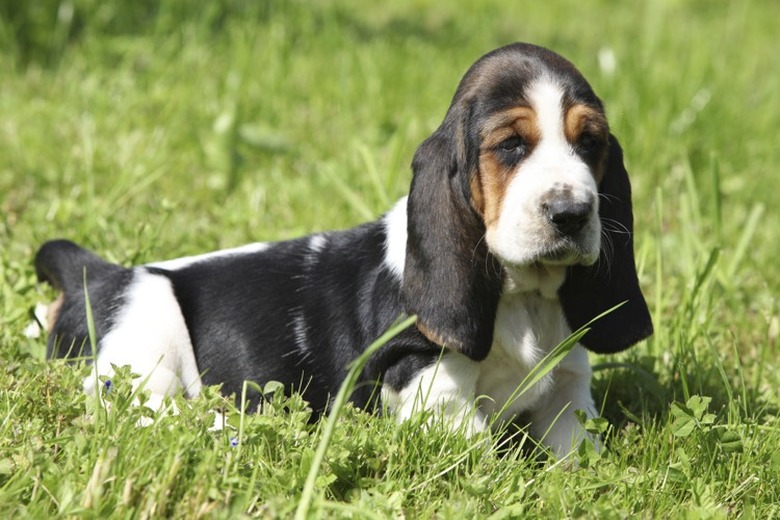Dog Breeds With Oily Coats
In the dog world, oily fur doesn't always signify dirty fur. Water dogs, for example, wear naturally oily coats that protect their skin as they swim. So put down the dehydrating shampoos and stop trying to cease the grease; these dogs give their owners reason to embrace their natural coats—oil and all.
Basset Hound
Short, stocky and strong, the basset hound stands 14 inches and can weigh up to 80 pounds. Bassets were originally bred in France as scent hounds to locate a variety of game such as rabbits, foxes, deer and wild boar. Their tri-colored coats are short, hard, dense and oily in order to repel dirt, water and other elements they may encounter during their sleuthing duties. Despite his scent-driven hunting abilities, the basset is a gentle, loyal companion who needs only moderate exercise to stay healthy. His floppy velvet ears, however, need more work. Basset hound ears require frequent cleaning to prevent odor and yeast infection.
Chesapeake Bay Retriever
Chesapeake Bay retrievers, or "Chessies" to breed enthusiasts, are tough, powerful water dogs ready to swim and dive at a moment's notice. They sport a thick, oily and nearly waterproof coat that allows them to glide through the water with ease. At home, when he's not swimming, this medium-sized companion is gentle and attentive—always ready to learn new tricks.
Labrador Retriever
One of the most popular working dogs, the Labrador retriever is known for his loyalty and friendly temperament; this breed makes a wonderful companion for children. Labs are double-coated, their outer coats coarse and oily and their undercoats thick and soft. Their two coats make them nearly waterproof. Good thing, because this high-energy pup loves to swim.
Newfoundland
If dogs could be lifeguards, the Newfoundland would be first in line. Newfoundlands were bred to be long-distance swimmers. Their heavy, oily coats protect their large, strong body from cold waters. Quite intelligent and active, this breed thrives with obedience training and plenty of physical activity. With daily brushing and plenty of room to run, Newfoundlands make great companions for both adults and children.
Cause for Concern
Some dogs don't have naturally oily coats, yet seem to become smelly oil slicks overnight. Allergies and skin infection can turn normally silky breeds such as Yorkies and pugs into stinky, stringy messes. Consult your veterinarian if your buddy's coat suddenly becomes greasy or changes in texture or feel.
By Christina Stephens
References
Dog Owner's Guide: The Basset Hound
petMD: Chesapeake Bay Retriever
petMD: Labrador Retriever
AKC: Get to Know the Newfoundland
petMD: Smelly Pets and Seven Ways to Deal with Them
About the Author
Christina Stephens is a writer from Portland, Ore. whose main areas of focus are pets and animals, travel and literature. A veterinary assistant, she taught English in South Korea and holds a BA in English with cum laude honors from Portland State University.
